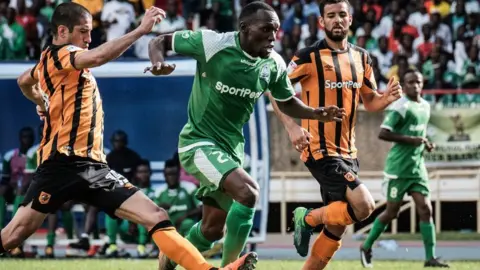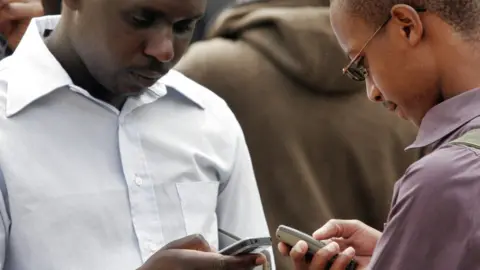Big winners, big losers: Kenya's addiction to gambling (original) (raw)

 AFP
AFP
Gambling is a multi-million dollar business in Kenya, but there are more losers than winners - with an increasing number of young people chancing their luck, writes Anthony Wanjiru.
The grey weather had not dampened the mood at the Mozzart Betting Shop in Westlands, Nairobi.
The punters continue to loudly place their wagers in the betting store, which is one of the many that dot Kenya's capital.
This is where I meet Ken Karanja, 29, who best embodies the gambling culture beguiling many young people in the city.


Ken Karanja, truck driver:

 Anthony Wanjiru
Anthony Wanjiru
"I am a betting addict"


He lives in Rwaka, a cosmopolitan area about 15km (nine miles) north-west of Nairobi, and makes 3,000 Kenyan shillings (£22; £30) a day as a truck driver - money which he often gambles away.
"I am a betting addict. I bet 100 Kenyan shillings a day and 1,000 to 1,500 Kenyan shillings during weekends," he says.
He used to frequent what were known as gambling dens, which were unregulated and where children could also place bets.
In the last four years, these have closed down, to be replaced by online gambling services - with people using their mobile phones, cyber cafes or one of the chains of new betting shops to place bets online on anything from the local league to World Cup matches.
Allure of instant money
This move has made it easier for people to place bets.
Mr Karanja has lost about $5,000 during a six-year gambling period. He bets because he wants to recover what he has lost, sometimes borrowing money or even charging his clients before doing a job.
Kenya has the highest number of young people in sub-Saharan Africa - between the ages of 17-35 - who gamble frequently, a 2017 GeoPoll survey found.

 AFP
AFP
No-one under 18 is now allowed into a betting shop
The country is the third-largest gambling market in Africa, after Nigeria and South Africa.
Figures from the gambling regulator, the Betting Control and Licensing Board (BCLB), show that gross gambling revenue for the 2016/2017 financial year was $198m (£151m) - equivalent to about half of the annual health budget.
However, the allure of instant money has come at a cost.
In 2016, a university student hanged himself after losing about $790 on a bet. Since then, more than five suicides and cases of bankruptcy, domestic violence and evictions have been reported.
To deter Kenyans from becoming problem gamblers, the government has introduced some taxes - the first, which came into affect in January, means betting firms must hand over 35% of their profits.
Nelson Gaichuhie, a senior official at Kenya's Treasury, says a second tax, to be introduced soon, will target gamblers themselves - taxing winnings.
"The government is worried about rampant betting, that is why we are still putting measures in place like taxing winnings at 20%," he says.
"We hope this will lower the appetite for betting."


You may also be interested in:


It has since signed new partnership agreements with Kenyan football leagues.
When asked whether the ease of online betting was proving too much of a temptation for young people, SportPesa's communications officer, Lola Okulo, said:
"We encourage our customers to approach gaming as an entertainment activity, not as an investment or job.
"They must be open to the possibility of winning or losing."
'Betting is glamorised'
For some, the government's measures are not going far enough.
"We want to push tax on betting from 35% to 50% because they are ripping off our poor young Kenyan youth and repatriating [the money] overseas," MP Godfrey Osotsi said.

 AFP
AFP
SportPesa has numerous partnerships with local and international teams
These sentiments are echoed by former MP Jakoyo Midiwo, who pushed for betting regulations before losing his seat in 2017.
He likened gambling to a "disease" in the East African country where many people use their phones as their wallets - transferring funds quickly via a text message without having to have a bank account.


More about Kenya:
- Money via mobile: The M-Pesa revolution
- Inside Africa's WhatsApp's gated communities
- Kenya facts and figures


"There is no online gambling in the US, you go to casinos. The problem is bigger in Kenya because of mobile money.
"As it is, your two-year-old child can bet [if they get hold of someone's phone]."
Academic Robert Nyamori argues that more long-lasting "preventative and curative" solutions are needed.
"Gambling machines are everywhere. Betting is glamorised, our newspapers tell us daily about the winners and never about the losers."
'I want to stop gambling'
Former gambling addict and farmer George Wainaina has decided to take things into his own hands with plans to sue the government, casinos and betting firms later this year.

 AFP
AFP
Many Kenyans use their mobiles to transfer funds without having to have bank accounts
"Betting is a problem that needs to be tackled head on. It's all youth think about these days," the 53-year-old says.
He wants to force betting establishments out of city centres, saying that Hong Kong and Macau set good examples as their gambling havens are on islands away from the mainland.
"The government should also ban advertising. These moves will see less people, especially children, exposed to betting."
Mr Karanja feels more needs to be done for addicts like him.
"I'd like to stop betting but lack funds to seek help," the truck driver says.
"The government should set up free counselling centres to help addicted youth.
"Parents should also monitor their children to ensure that they aren't sucked into the vice."